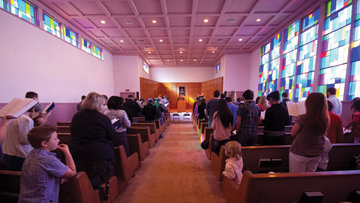You have free articles remaining this month.
Subscribe to the RP Witness for full access to new articles and the complete archives.
One of the joys of doing ministry in the Reformed Presbyterian Church of North America is having the opportunity to introduce people to the wonder of psalm singing. There are people, even Christians, who do not realize that the Psalms can be sung, indeed, that they were written to be sung and should be sung. Learning this can be an epiphany for some, especially if they already read and esteem the Psalms and have come to know the great blessing of this portion of God’s Word.
However, there may be those who esteem the Psalms, and even those who sing the Psalms, who do not yet realize their full blessing. The Psalms were not written to be sung simply for singing’s sake, any more than they were written to be read simply for reading’s sake. Whether sung or read, the Psalms are ours for the sake of the pastoral care that Christ affords us through them. The Psalms serve to affirm both our positive and negative emotions—that is, both joy and sorrow, peace and anger, love and hatred. Given our sin, given how easily we are led astray by our emotions, the Psalms also serve to teach us how to rejoice and how to weep, how to be at peace and how to rage, how to love and how to hate.
When we hear the term “pastoral care,” we may tend to think of it too narrowly. We may think only of what a pastor does for a member of his congregation in difficult times. But pastoral care means more than that. Pastoral care refers to everything that a pastor does to care for his flock, starting in the pulpit and including his teaching, discipleship, counseling, and indeed, his visitations to the home and hospital. Even more, pastoral care should include teaching God’s people to care for themselves.
Individuals never graduate beyond the need of a pastor’s care, as James 5:14 says: “Is anyone among you sick? Let him call for the elders of the church, and let them pray over him, anointing him with oil in the name of the Lord.” However, as we get older and mature in life, we must learn to care for our own souls by the right use of God’s Word and through a direct ministry of Christ, the chief Shepherd.
The God Who Delights
The Psalms are an indispensable tool for understanding our emotions and learning to care for ourselves. The way to start in learning to care for ourselves is by understanding that God is a God who delights. Our emotions are affirmed when we see from Scripture that God is a God of emotion. From the beginning, we see God delighting in His works. One of the refrains of the Creation story in Genesis 1 is “And God saw that it was good.” The chapter’s conclusion states that “God saw everything that he had made, and behold, it was very good.” Clearly the point is not that God was surprising Himself by how well He was doing. Surely it was not the case that, stopping to evaluate, each time He decided, that, yes, “it is good.” The point instead is to see God delighting in His creation!
Not only does God delight in His works—not only does He take joy and pleasure in all that He has made—but also God is angry and full of sorrow for sin’s corruption of His creation. Thus, we see the full range of emotions within the being of God. If the question hasn’t already risen in the reader’s mind, then let me raise it now: Why then do we speak of the “impassibility” of God? Chapter 2, Article 1 of the Westminster Confession of Faith says, “There is but one only, living, and true God, who is infinite in being and perfection, a most pure spirit, invisible, without body, parts, or passions.” To say that God is without “passions,” which can be read as another word for emotions, is not to deny that emotions are attributed to God in Scripture. Instead, the point is that God does not have emotions as we have them as creatures of sin. The impassibility of God means that He is never ruled by feelings and certainly is never sinful in His emotions.
God’s People of Delight
While God’s Word affirms our emotions as creatures made in the image of God, Scripture also gives warning of the danger of our emotions. For us, as emotions come, so comes temptation to sin, perhaps especially in our anger. The answer is not to deny our emotions but to evaluate them according to God’s Word and to express them rightly, imitating God. To put it another way, we are called to bear the image of God in the experience and expression of our emotions. Therefore, as God delights in His works as a revelation of His glorious character, so we are called to take joy in His works and glorious character. If we find ourselves delighting in sin, such as using human nakedness and violence as forms of entertainment, we must repent and delight instead in what God delights in.
As God is angry at the rebellion of mankind and as He hates sin, so we are called to be angry at rebellion and to hate sin, both in ourselves and in others. If we find ourselves making peace with sin, excusing or even encouraging sin in ourselves or others, we must repent and learn more and more to hate what God hates.
As Christ wept for the death of Lazarus (even though He knew He was going to raise him again on that very day), so we are called to weep for ourselves and to weep with others (even as we have hope in the resurrection). And if we find ourselves sanctifying the “stiff upper lip,” as if it were a sin to cry and a matter of holiness to refuse to feel pain, then we must again repent and learn to give a right expression to our sorrow.
The Liberation of Emotion
This can be a lesson of great liberation for some people. Many of us come out of ethnic cultures or family traditions that have indeed sanctified the “stiff upper lip.” A good example of this is found in the Little House series of books by Laura Ingalls Wilder. Those who have read her books are likely to recall that Laura’s parents regularly chastised her for crying, whether or not there was some legitimate reason for her to cry. I’m not an anthropologist, so it is beyond my scope to offer an explanation for the source and history of this philosophy of emotion. However, I am a pastor and am enough of a student of God’s Word to recognize that as an error. Some practice not just a philosophy of emotion, but even an errant theology of emotion, wrongly believing that God expects His people to bury their hurt and anger, and to limit the expression of their joy to a vague Mona Lisa smile.
In contrast, consider what the Psalms say. Concerning joy, Psalm 20:5 says, “May we shout for joy over your salvation, and in the name of our God set up our banners.” Shout! Sing! Rejoice! These are the exhortations of the Psalms. Psalm 107:2 says, “Let the redeemed of the Lord say so, whom he has redeemed from trouble.” We are often chastised (perhaps rightly) for not witnessing more to our unbelieving neighbors, but why are we not encouraged more to give joyful witness in the church? The redeemed of the Lord are to say so! They are called to say that they are redeemed, giving joyful testimony to the saving work of Christ both in glad conversation and rapturous song.
What do the Psalms say about our anger? First, the Psalms affirm our anger, making it clear that it is not necessarily wrong to be angry. Sometimes it is wrong for us not to be angry. If someone has abused you, whether yesterday or years ago, you ought to be angry and you surely cannot help but be angry!
Second, the Psalms give clear warning that anger is a great occasion for temptation. Anger is not inherently sinful, but we must be extraordinarily careful. We must respond to injury and give expression to anger in the right way. Psalm 4:4 says, “Be angry, and do not sin” (also quoted by Apostle Paul in Ephesians 4:6), and “ponder in your own hearts on your beds, and be silent.” There are times when we should hold our anger, but we also see in the Psalms the outpouring of anger as an expression of righteous indignation for the cruel deeds of wicked men.
So third, we must take our anger to God. We can cry to Him for justice, calling upon Him to deal equitably with those who have callously hurt and injured us. This we see in Psalm 137. Despite its graphic and violent imagery, we observe that God’s people were crying for justice: “Blessed shall he be who repays you with what you have done to us! Blessed shall he be who takes your little ones and dashes them against the rock!” We can barely imagine the pain, sorrow, and anger that the Israelites were feeling, having seen their babies pulled from their mothers’ arms and dashed against the stony ground. But the reflections on this extreme occasion in Psalm 137 give us permission to take our anger, of whatever degree, to God as a cry for justice, trusting Him to do what is right.
The Psalms: A Guide and Guild
The Psalms are both a guide and a guild for our emotions. The Psalms are a guide because they teach us about our emotions. They define what joy and sorrow, peace and anger, and love and hatred are as these emotions are rightly found in the hearts of God’s people in Christ. Thus, the Psalms affirm our emotions while also warning us of the temptations we will face as our emotions arise.
The Psalms are also a guild because here we find fellowship with others in the emotions common to living in covenant relationship with God. The Psalms can serve as a pattern for our prayers; but when our own words completely fail us, they can also be taken as the very prayers that we use to cry out to God, whether in joy or in sorrow. Surely the care of Christ for His sheep is found in the Psalms. Surely there is a great blessing here, a blessing that grows more lavishly upon us each hour that we spend in the book of Psalms.
—Stephen Rhoda
Stephen Rhoda is pastor of Westminster (Prairie View, Ill.) RPC and director of ministry for Ephphatha Reformation Ministries. He and his wife, Mary, are parents to three children: Jacob, Philip, and Abigail. While not pastoring his congregation, contributing to the homeschooling of his children, or doing the dishes, Steve enjoys watching The Andy Griffith Show on Netflix.

